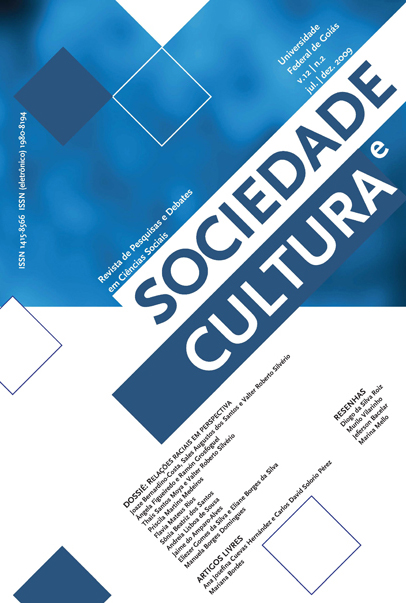Globalização e Etnicização em Salvador
DOI:
https://doi.org/10.5216/sec.v12i2.5836Palavras-chave:
globalização, etnicidade, associativismo, Salvador (Bahia)Resumo
Neste texto propõe-se refletir sobre alguns aspectos do processo, presente e passado, de construção de uma identidade cultural afro-brasileira e dos seus laços com outros territórios e culturas, constituindo um meio de mobilização para a reivindicação da plena cidadania no plano transnacional. Ao longo da história, os negros brasileiroscelebraram continuadamente a sua africanidade ou negritude, mas só recentemente os negros de Salvador puderam-no fazer abertamente. Mas nunca, como hoje, a globalização permitiu uma divulgação de signifi cantes em nível planetário. Através da mídia ou pela internet, os interessados podem, independentemente do lugar geográfico a que pertencem, conhecer a cultura negro-africana e/ou definir uma cultura da diáspora africana.Downloads
Não há dados estatísticos.
Downloads
Publicado
2010-03-18
Como Citar
DOMINGUES, MANUELA BORGES. Globalização e Etnicização em Salvador. Sociedade e Cultura, Goiânia, v. 12, n. 2, p. 325–330, 2010. DOI: 10.5216/sec.v12i2.5836. Disponível em: https://revistas.ufg.br/fcs/article/view/5836. Acesso em: 28 jan. 2026.
Edição
Seção
Dossiê
Licença
Autores/as que publicam nesta revista concordam com os seguintes termos:
- Autores/as mantêm os direitos autorais e concedem à revista o direito de primeira publicação, sendo o trabalho simultaneamente licenciado sob a Creative Commons Attribution License, o que permite o compartilhamento do trabalho com reconhecimento de autoria e da publicação inicial nesta revista.
- Autores/as têm autorização para assumir contratos adicionais separadamente, para distribuição não exclusiva da versão do trabalho publicada nesta revista (ex.: publicar em repositório institucional ou como capítulo de livro), com reconhecimento de autoria e da publicação inicial nesta revista.
- Autores/as têm permissão e são estimulados/as a publicar e a distribuir seu trabalho online (ex.: em repositórios institucionais ou na sua página pessoal) a qualquer ponto antes ou durante o processo editorial, já que isso pode gerar alterações produtivas, bem como aumentar o impacto e a citação do trabalho publicado (veja O Efeito do Acesso Livre).


 Esta revista está licenciada sob a licença
Esta revista está licenciada sob a licença 
